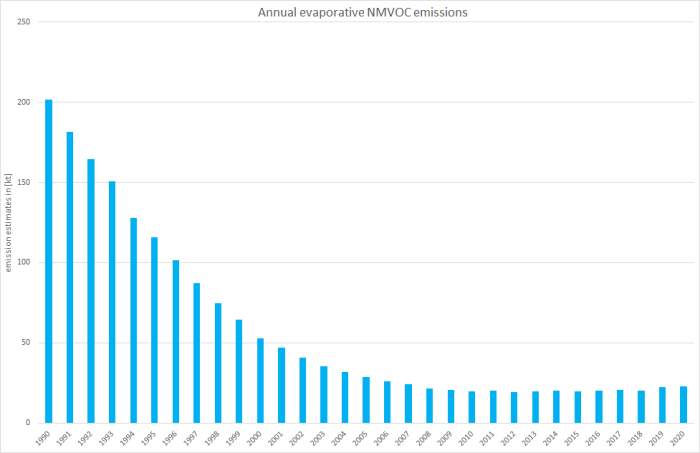meta data for this page
1.A.3.b v - Gasoline Evaporation
Short description
In category 1.A.3.b v - Road Transport: Gasoline evaporation fugitive emissions from the evaporation of gasoline from road vehicles are reported.
| Category Code | Method | AD | EF | ||||||||||||
|---|---|---|---|---|---|---|---|---|---|---|---|---|---|---|---|
| 1.A.3.b v | T2 | NS, M | CS, M | ||||||||||||
| NOx | NMVOC | SO2 | NH3 | PM2.5 | PM10 | TSP | BC | CO | Pb | Cd | Hg | Diox | PAH | HCB | |
| Key Category: | - | L/T | - | - | - | - | - | - | - | - | - | - | - | - | - |
Methodology
Activity data
Specific data for gasoline evaporation from road vehicles are generated within TREMOD 1). - The following table provides an overview of annual amounts of gasoline evaported from road vehicles in Germany.
Table 1: Annual amount of gasoline evaporated from road vehicles, in kilotonnes
| 1990 | 1995 | 2000 | 2005 | 2006 | 2007 | 2008 | 2009 | 2010 | 2011 | 2012 | 2013 | 2014 | 2015 | 2016 | 2017 | 2018 | 2019 | 2020 | |
|---|---|---|---|---|---|---|---|---|---|---|---|---|---|---|---|---|---|---|---|
| PCs | 10,915 | 9,222 | 8,541 | 7,514 | 7,078 | 6,694 | 6,382 | 6,328 | 6,173 | 6,085 | 5,775 | 5,725 | 5,718 | 5,502 | 5,498 | 5,605 | 5,321 | 5,336 | 4,914 |
| LDVs | 174 | 164 | 147 | 95 | 85 | 76 | 66 | 60 | 55 | 51 | 46 | 43 | 47 | 49 | 53 | 59 | 63 | 68 | 69 |
| Mopeds | 48 | 41 | 43 | 47 | 48 | 52 | 54 | 62 | 58 | 57 | 54 | 56 | 56 | 59 | 59 | 58 | 58 | 59 | 60 |
| Motorcycles | 102 | 94 | 198 | 215 | 207 | 198 | 184 | 168 | 154 | 142 | 131 | 124 | 129 | 136 | 138 | 143 | 135 | 139 | 144 |
| Ʃ 1.A.3.b v | 11,283 | 9,521 | 8,928 | 7,871 | 7,417 | 7,020 | 6,686 | 6,618 | 6,440 | 6,335 | 6,006 | 5,948 | 5,951 | 5,745 | 5,748 | 5,865 | 5,577 | 5,601 | 5,187 |
source: TREMOD
(Implied) Emission factors
Tier3 emission factors representing the effect of mitigation technologies are derived from TREMOD.
Table 2: Overview of implied emission factors per vehcile type, in kg/t
| Mitigation | 1990 | 1995 | 2000 | 2005 | 2006 | 2007 | 2008 | 2009 | 2010 | 2011 | 2012 | 2013 | 2014 | 2015 | 2016 | 2017 | 2018 | 2019 | 2020 | |
|---|---|---|---|---|---|---|---|---|---|---|---|---|---|---|---|---|---|---|---|---|
| PCs | Euro_1_I | 0,17 | 1,04 | 1,58 | 2,07 | 2,22 | 2,39 | 2,48 | 2,56 | 2,66 | 2,81 | 2,89 | 3,00 | 3,09 | 3,21 | 3,27 | 3,31 | 3,42 | 3,58 | 4,05 |
| Euro_2_II | 1,13 | 1,61 | 2,10 | 2,24 | 2,40 | 2,46 | 2,58 | 2,72 | 2,91 | 3,07 | 3,28 | 3,48 | 3,75 | 3,96 | 4,15 | 4,46 | 4,84 | 5,57 | ||
| Euro_3_III | 1,59 | 2,08 | 2,21 | 2,37 | 2,39 | 2,48 | 2,58 | 2,73 | 2,87 | 3,03 | 3,17 | 3,39 | 3,55 | 3,69 | 3,94 | 4,33 | 5,00 | |||
| Euro_4_IV | 1,37 | 1,62 | 1,70 | 1,79 | 1,76 | 1,79 | 1,86 | 1,99 | 2,11 | 2,25 | 2,38 | 2,54 | 2,66 | 2,77 | 2,95 | 3,37 | 3,87 | |||
| Euro_5_V | 1,39 | 1,39 | 1,46 | 1,53 | 1,60 | 1,69 | 1,77 | 1,91 | 2,04 | 2,16 | 2,35 | 2,89 | 3,33 | |||||||
| Euro_6ab_VI | 1,47 | 1,63 | 1,56 | 1,56 | 1,42 | 1,43 | 1,48 | 1,53 | 1,58 | 1,67 | 2,24 | 2,62 | ||||||||
| Euro_6c_VI | 0,24 | 1,31 | 1,82 | 2,11 | ||||||||||||||||
| Euro_6d_temp_VI | 0,25 | 0,24 | 1,73 | 1,99 | ||||||||||||||||
| Euro_6d_VI | 0,39 | 1,70 | 2,26 | |||||||||||||||||
| pre-Euro | 22,4 | 29,2 | 32,6 | 32,3 | 31,5 | 32,1 | 31,5 | 29,2 | 28,8 | 28,9 | 28,3 | 28,4 | 28,4 | 26,1 | 26,0 | 26,0 | 26,5 | 26,9 | 26,9 | |
| LDVs | Euro_1_I | 0,72 | 1,11 | 1,75 | 1,89 | 2,12 | 2,24 | 2,55 | 2,82 | 3,18 | 3,40 | 3,73 | 3,58 | 3,66 | 3,55 | 3,40 | 2,95 | 2,74 | 2,86 | |
| Euro_2_II | 0,80 | 1,31 | 1,45 | 1,64 | 1,78 | 2,06 | 2,32 | 2,67 | 2,90 | 3,23 | 3,16 | 3,30 | 3,25 | 3,16 | 2,85 | 2,72 | 2,88 | |||
| Euro_3_III | 0,81 | 0,95 | 1,07 | 1,20 | 1,40 | 1,60 | 1,87 | 1,98 | 2,24 | 2,24 | 2,37 | 2,38 | 2,37 | 2,18 | 2,14 | 2,32 | ||||
| Euro_4_IV | 0,63 | 0,85 | 0,90 | 0,91 | 0,98 | 1,09 | 1,26 | 1,49 | 1,74 | 1,78 | 1,91 | 1,97 | 2,02 | 1,97 | 2,08 | 2,30 | ||||
| Euro_5_V | 0,25 | 0,37 | 0,86 | 0,86 | 0,89 | 1,00 | 0,99 | 1,04 | 1,08 | 1,14 | 1,15 | 1,32 | 1,50 | |||||||
| Euro_6ab_VI | 0,47 | 0,58 | 0,93 | 0,74 | 0,75 | 0,73 | 0,71 | 0,69 | 0,83 | 0,93 | ||||||||||
| Euro_6c_VI | 0,21 | 0,20 | 0,19 | |||||||||||||||||
| Euro_6d_temp_VI | 0,19 | 0,18 | 0,18 | |||||||||||||||||
| Euro_6d_VI | 0,17 | 0,18 | 11,20 | 12,04 | 12,26 | 12,22 | 14,36 | 3,41 | ||||||||||||
| pre-Euro | 23,6 | 20,3 | 20,4 | 21,1 | 21,1 | 21,7 | 22,1 | 23,4 | 24,3 | 25,9 | 24,0 | 24,8 | 23,8 | 23,1 | 21,6 | 20,3 | 19,4 | 18,9 | 18,9 | |
| Mopeds | Euro_1_I | 16,6 | 15,0 | 14,9 | 14,7 | 14,6 | 14,3 | 14,6 | 14,9 | 15,2 | 15,4 | 15,8 | 16,0 | 16,4 | 16,9 | 17,1 | 17,3 | 17,6 | ||
| Euro_2_II | 0 | 13,2 | 12,9 | 12,4 | 12,1 | 11,6 | 11,6 | 11,7 | 11,3 | 11,2 | 11,2 | 11,3 | 11,3 | 11,5 | 11,5 | 11,7 | 12,0 | |||
| Euro_4_IV | 9,34 | 9,26 | 9,33 | |||||||||||||||||
| Euro_5_V | ||||||||||||||||||||
| pre-Euro | 37,4 | 19,2 | 19,9 | 18,0 | 17,9 | 17,5 | 17,4 | 17,0 | 17,4 | 17,7 | 17,9 | 18,0 | 18,2 | 18,1 | 18,3 | 18,8 | 18,8 | 18,8 | 19,1 | |
| Motorcycles | Euro_1_I | 14,2 | 14,0 | 14,6 | 15,5 | 15,4 | 17,1 | 18,8 | 21,0 | 23,0 | 25,5 | 25,9 | 25,7 | 26,7 | 27,2 | 28,3 | 28,3 | 28,9 | ||
| Euro_2_II | 11,0 | 11,4 | 12,2 | 12,3 | 13,8 | 15,3 | 17,1 | 18,8 | 21,0 | 21,3 | 21,3 | 22,2 | 22,7 | 23,7 | 23,9 | 24,6 | ||||
| Euro_3_III | 10,7 | 8,5 | 8,8 | 8,9 | 10,0 | 11,0 | 12,3 | 13,3 | 14,6 | 14,6 | 14,3 | 14,6 | 14,8 | 15,6 | 15,7 | 16,2 | ||||
| Euro_4_IV | 14,0 | 14,6 | 15,2 | 15,8 | 15,8 | 16,2 | ||||||||||||||
| Euro_5_V | ||||||||||||||||||||
| pre-Euro | 23,3 | 24,8 | 16,6 | 17,6 | 18,3 | 19,3 | 19,1 | 21,2 | 23,4 | 26,0 | 28,4 | 31,3 | 31,6 | 31,0 | 31,9 | 32,1 | 33,0 | 32,6 | 32,8 |
Discussion of emission trends
Table 3: Outcome of Key Category Analysis
| for: | NMVOC |
|---|---|
| by: | Level & Trend |
NFR 1.A.3.b v is key source for emissions of Non-Methane Volatile Organic Compounds - NMVOC. (fugitive emissions only; no NMVOC emissions from fuel combustion included)
Since its maximum level of over 11,000 kilotonnes in 1990, the amount of evaporated gasoline is decreasing - and so are the related NMVOC emissions. The amounts of evaporated gasoline are connected directly with those of gasoline consumed. Here, the decrease becomes sharper from 2000 onwards following a growing switch from gasoline to diesel oil especially in passenger cars. Here, the annual amounts of NMVOC emissions from evaporation not only depend directly on the amount of evaporated gasoline but also on the number of vehicles equipped with mitigation technologies. Thus, the decrease is sharpest straight after 1990 and since then slowing down.
Recalculations
Activity data have been revised for all years as of 2013.
Table 4: Revised annual amounts of evaporated gasoline, in kilotonnes
| 1990 | 1995 | 2000 | 2005 | 2010 | 2011 | 2012 | 2013 | 2014 | 2015 | 2016 | 2017 | 2018 | 2019 | |
|---|---|---|---|---|---|---|---|---|---|---|---|---|---|---|
| current submission | 11.239 | 9.521 | 8.928 | 7.871 | 6.440 | 6.335 | 6.006 | 5.948 | 5.951 | 5.745 | 5.748 | 5.865 | 5.577 | 5.601 |
| previous submission | 11.239 | 9.521 | 8.928 | 7.871 | 6.440 | 6.335 | 6.006 | 5.949 | 5.952 | 5.749 | 5.756 | 5.880 | 5.598 | 5.631 |
| absolute change | 0,00 | 0,00 | 0,00 | 0,00 | 0,00 | 0,00 | -0,03 | -0,36 | -1,38 | -3,91 | -8,56 | -14,8 | -21,0 | -29,2 |
| relative change | 0,00% | 0,00% | 0,00% | 0,00% | 0,00% | 0,00% | 0,00% | -0,01% | -0,02% | -0,07% | -0,15% | -0,25% | -0,38% | -0,52% |
In addition, the NMVOC emission factors applied were revised for several years.
As a result, NMVOC emissions from gasoline evaporation were re-estimated as follows:
Table 5: Re-estimated NMVOC emissions, in kilotonnes
| 1990 | 1995 | 2000 | 2005 | 2006 | 2007 | 2008 | 2009 | 2010 | 2011 | 2012 | 2013 | 2014 | 2015 | 2016 | 2017 | 2018 | 2019 | |
|---|---|---|---|---|---|---|---|---|---|---|---|---|---|---|---|---|---|---|
| current submission | 201 | 116 | 52.9 | 28.6 | 25.8 | 24.4 | 21.3 | 20.5 | 19.9 | 20.0 | 19.3 | 19.6 | 20.0 | 19.9 | 20.2 | 20.7 | 20.1 | 22.2 |
| previous submission | 201 | 116 | 52.9 | 28.6 | 25.8 | 24.4 | 21.3 | 20.5 | 19.9 | 20.0 | 19.3 | 19.6 | 20.0 | 19.9 | 20.3 | 20.8 | 20.3 | 22.6 |
| absolute change | 0.0 | 0.00 | 0.00 | 0.00 | 0.00 | 0.00 | 0.00 | 0.00 | 0.00 | 0.00 | 0.00 | 0.00 | -0.01 | -0.02 | -0.03 | -0.06 | -0.11 | -0.38 |
| relative change | 0.00% | 0.00% | 0.00% | 0.00% | 0.00% | 0.00% | 0.00% | 0.00% | 0.00% | 0.00% | 0.00% | -0.01% | -0.04% | -0.09% | -0.17% | -0.28% | -0.57% | -1.66% |
For pollutant-specific information on recalculated emission estimates for Base Year and 2019, please see the recalculation tables following chapter 8.1 - Recalculations.
Planned improvements
Besides a routine revision of the underlying model, no specific improvements are planned.


